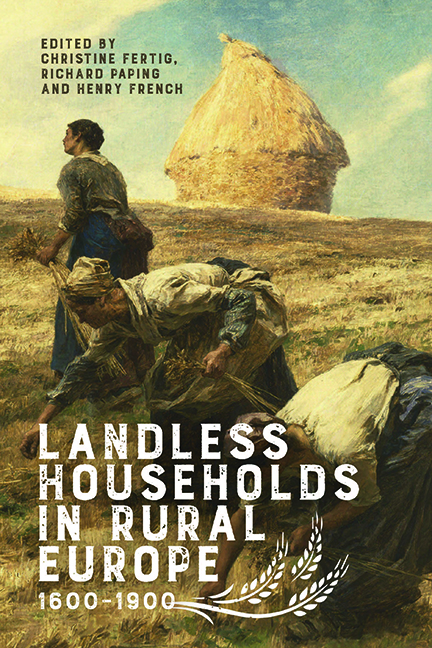Book contents
- Frontmatter
- Contents
- List of Illustrations
- Notes on Contributors
- Preface
- Introduction
- 1 The Treballadors of Girona: Evidence of the Emergence of Wage Labour in Early Modern Catalonia in the Sixteenth and Seventeenth Centuries
- 2 The Squatter Economy of the English Countryside: Building New Landless Communities in England, c. 1600–1900
- 3 The Rise of Landless Households in the Dutch Countryside, c. 1600–1900
- 4 ‘Gaining Ground’ in Flanders after the 1840s: Access to Land and the Coping Mechanisms of Landless and Semi-Landless Households, c. 1850–1900
- 5 Strategies of Survival, Landlessness and Forest Settlement in Flanders: The Forest of Houthulst in a Changing Landscape of Survival (c. 1500–1900)
- 6 Landless and Pauper Households in England, c. 1760–1835: A Comparison of Two Southern English Rural Communities
- 7 Landless Rural Households in France, 1852–1910
- 8 Survival in a Hostile Agrarian Regime: Landless and Semi-Landless Households in Seventeenth-Century Sweden and Finland
- 9 Farming Craftsmen? Access to Land and the Socio-Economic Position of Rural Artisans in Early Modern Finland
- 10 Landlessness and Marriage Restrictions: Tyrol and Vorarlberg in the Eighteenth and Nineteenth Centuries
- 11 Cottages, Barns and Bake Houses: Landless Rural Households in North-Western Germany in the Eighteenth Century
- Bibliography
- Index
- Boydell Studies in Rural History
4 - ‘Gaining Ground’ in Flanders after the 1840s: Access to Land and the Coping Mechanisms of Landless and Semi-Landless Households, c. 1850–1900
Published online by Cambridge University Press: 08 October 2022
- Frontmatter
- Contents
- List of Illustrations
- Notes on Contributors
- Preface
- Introduction
- 1 The Treballadors of Girona: Evidence of the Emergence of Wage Labour in Early Modern Catalonia in the Sixteenth and Seventeenth Centuries
- 2 The Squatter Economy of the English Countryside: Building New Landless Communities in England, c. 1600–1900
- 3 The Rise of Landless Households in the Dutch Countryside, c. 1600–1900
- 4 ‘Gaining Ground’ in Flanders after the 1840s: Access to Land and the Coping Mechanisms of Landless and Semi-Landless Households, c. 1850–1900
- 5 Strategies of Survival, Landlessness and Forest Settlement in Flanders: The Forest of Houthulst in a Changing Landscape of Survival (c. 1500–1900)
- 6 Landless and Pauper Households in England, c. 1760–1835: A Comparison of Two Southern English Rural Communities
- 7 Landless Rural Households in France, 1852–1910
- 8 Survival in a Hostile Agrarian Regime: Landless and Semi-Landless Households in Seventeenth-Century Sweden and Finland
- 9 Farming Craftsmen? Access to Land and the Socio-Economic Position of Rural Artisans in Early Modern Finland
- 10 Landlessness and Marriage Restrictions: Tyrol and Vorarlberg in the Eighteenth and Nineteenth Centuries
- 11 Cottages, Barns and Bake Houses: Landless Rural Households in North-Western Germany in the Eighteenth Century
- Bibliography
- Index
- Boydell Studies in Rural History
Summary
When I’ll be gone, it may be a bit easier to lease the farm; but after the next tenant will have spent 65 to 75 thousand francs to be wellestablished, he will only be a farmer-slave, having no house for his labourers, nothing else to compel them than subletting them some land. Hadn't I held them [the workers] close to me, by leaving them the grass where the cows or sheep couldn't reach, or the oats chaff at reduced price, doing their ploughing at a low price, driving the corpses to the cemetery for free, or supplying all kinds of help whenever needed and other indulgences, I would have found myself often in need [of workers], because a farm like this sometimes needs many hands. In future, it will become more and more difficult, because my old reapers are decaying from old age, while the best go to France.
This was written in 1879 by F. De Roo, tenant of the Hof te Biesdonk, to the administrators of the Civil Hospices in Oudenaarde, his landlord. The Hof te Biesdonk was a large farm in Machelen, a village at the Lys River near Deinze, Flanders. After renting the farm for eighteen years, he wrote them a letter recounting how many investments and how little profit he had made. He informed them that, if they did not lower the rent and accept more lenient conditions, he would try to find another farmstead.
In this fragment, he lamented the scarcity of labour and the ‘soft’ and ‘not-so-soft’ power at his disposal to make people work for him. His means of soft power included the fodder and services he provided his neighbours with, either cheaply or even for free. Yet clearly, he believed the not-so-soft means worked better: he was able to sublet some land to his workers (a lease that he could terminate if they refused to work), but wished he could rent them houses as well, because that would do even better. Later, Benoît Bouché, in his 1913 study on farm labourers in Belgium, wrote that these means of soft power, the manifold services provided by farmers to their workers, were ‘gaining ground’.
- Type
- Chapter
- Information
- Landless Households in Rural Europe, 1600-1900 , pp. 91 - 116Publisher: Boydell & BrewerPrint publication year: 2022



